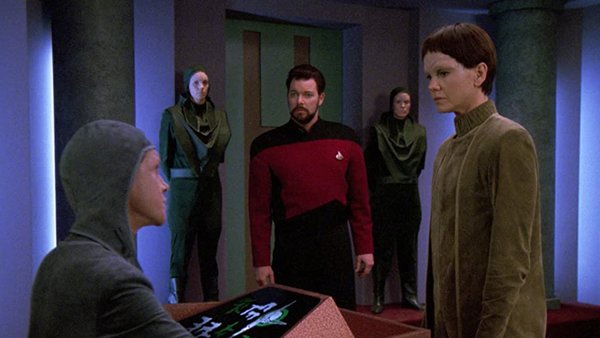10 Times Star Trek: The Next Generation Went Woke
4. Gender Trouble

The late 1980s/early 1990s was a heady time for queer activism and queer theory. Groups like Queer Nation and Act Up emerged to fight against homophobia, for LGBTQ+ rights, and for action on HIV/AIDS. In 1990, Judith Butler published the revolutionary work Gender Trouble: Feminism and the Subversion of Identity that challenged the very essence of our ideas on gender and, along with Eve Kosofsky Sedgwick's Epistemology of the Closet in particular, was one of the foundational texts of queer theory. At the time, there was also good reason to believe that Star Trek was going to cross its final frontier of homosexuality.
"Star Trek: The Next Genderation: Queer Characters Join the Enterprise Crew," American LGBTQ+ magazine The Advocate punned and prognosticated in the title of an article from August 1991. Later that same year, The Los Angeles Times announced, "Star Trek Is on Another Bold Journey," and that "This season, gays and lesbians will appear unobtrusively aboard the Enterprise in the 24th century." The apparent certainty came from a statement Gene Roddenberry had released to The Advocate in July 1991, which read:
In the fifth season of Star Trek: The Next Generation, viewers will see more of shipboard life in some episodes, which will, among other things, include gay crewmembers in day-to-day circumstances.
Whether or not that promise would ever have come to fruition is impossible to say. Roddenberry's declining health had meant his day-to-day involvement in The Next Generation was minimal before his death in October 1991. Rick Berman and Michael Piller were already firmly in charge. As we know, there were no gay characters in season five, but we did get an episode that attempted to deal with the issue of homophobia.
The Outcast was written by Jeri Taylor who, in Cinefantastique, Vol 23, No 2-3 of October 1992, firmly framed her script as a "gay rights story." Taylor added, "It absolutely, specifically, and outspokenly dealt with gay issues." In the same Cinefantastique article, Michael Piller also commented on the genesis of the episode:
What it came down to was Roddenberry had been barraged by letters and had discussed with us before his death the possibility of having two men hold hands in some scene, which was totally irrelevant to the issue of homosexuality. I didn't think, nor did Rick [Berman], that was an appropriate way to do a story that addressed the issue of sexual intolerance.
Make of that what you will. In allegorical fashion, and not least in the directness of its title, The Outcast does effectively deal with the matter of homophobia, and arguably transphobia, through Soren of the J'naii, a species for whom gender is considered "unnatural," even a "perversion." In the episode, Soren 'comes out' to identify as female, only to face the extreme prejudice of her society.
"I am tired of lies. I am female. I was born that way. I have had those feelings, those longings, all of my life. It is not unnatural," Soren proclaims in her devastatingly moving and impassioned speech at her trial, a speech that cannot fail to resonate in the most profound sense with any LGBTQIA+ viewer. The moment is a powerful rallying cry for love, openness, and acceptance, and against the monstrous practice of conversion therapy (the J'naii's "psychotectic treatments"). "I do not need to be cured. What I need, and what all of those who are like me need, is your understanding and your compassion," Soren adds.
As laudable as the message of The Outcast was, it also marked the limits of the issue for The Next Generation. Jonathan Frakes himself thought the episode "wasn't gutsy enough." In truth, Star Trek would stop short of any kind of positive gay representation for quite some time. There had been another script written for The Next Generation which included gay characters more directly. For that story, we have to go back to before the series had even begun.